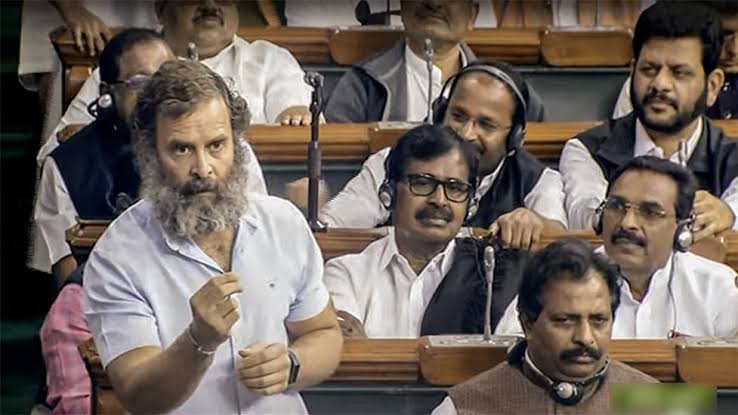The party, along with its allies, needs to get the electoral arithmetic right rather than dabbling in soft Hindutva.
Sanjay Kapoor
Immediately after Congress’ humiliating defeat at the hands of the BJP in 2014, senior leader A K Antony was given the task to ascertain the reasons. His advice was succinct: Congress was perceived to be anti-Hindu and it should do something to correct that impression. There were also suggestions that the party should celebrate Hindu festivals in the party offices around the country. In other words, conduct itself the way BJP did.
Interestingly, Antony, who had an incorruptible lily white image in his party and outside did not believe that the Congress lost due to a rash of gargantuan corruption scams that were leveled against many of its leaders. Like all politicians of yore, voting behaviour is not determined by issues of corruption or governance, but more by caste and religion.
Antony has come to grief with BJP tweezing out his son, Anil, from the family and the party after the CBI interrogated him on Tetra truck purchase scandal. However, there is some merit in Antony’s diagnosis.
The truth is that if the BJP and its Hindutva juggernaut has to be fought, then the Congress and the opposition have to recalibrate their strategy and learn some lessons from how religious populists have been defeated electorally in different parts of the world. An important takeaway from a recount of these instances is that none of them lost the polls due to exposure of corruption scandals. So Rahul Gandhi raising the issue of Gautam Adani’s alleged money laundering and cronyism is unlikely to unsettle Prime Minister Modi’s chances of re-election in 2024.
Around the World
History is full of instances when seemingly impossible arithmetic in favour of a majoritarian populist falls short before a coalition of minorities, secularists and more. The sine qua non for this to happen depends on the strength of the institutions, especially those that oversee the conduct of the elections. We will not go too long back in history to dig up instances of how such leaders were defeated, but look at the more recent examples when voters upset all calculations to show the exit door to those who felt confident in numbers and their exclusionary rhetoric.
Take, for example, the ouster of Mahinda Rajapakse in 2015 as the President of Sri Lanka after he had ruled the island nation for 10 years. He thought he was at the crest of his popularity when he fell short against a coalition comprising Hindu minorities, Muslims, secularists, Marxists and others. Final results showed that Rajapakse’s party got 47 percent votes against the wining coalition’s 51 percent, which was led by MRS Sirisena. Rajapakse used strong-arm tactics, but could not defeat a coalition in which 71 percent were majority Sinhala.
Even in US presidential polls, many contenders over the years failed to trump this arithmetic led by minorities, secularists and others. For instance, in 2102, Mitt Romney, the Republican candidate got everything wrong, including his pitch, against the incumbent President Barack Obama. He fell short because of the simple logic that, in an election, when both the incumbent and the challenger are disliked, the incumbent wins. Obama was supported in large measure by minorities and also women who were afraid of the conservative Republicans. Here again, the white supremacists that were to defeat a coloured President failed.
The same script followed in 2020 elections, when President Donald Trump seemed to be the likely winner till he was overwhelmed by the opposition. In Brazil, again, the rightwing leader in Jair Bolsonaro lost by a whisker to Ernesto Lula due to coming together of all the parties in the opposition that represented the harassed indigenous people, secularists and many others who did not like Bolsonaro’s aggressive populism. Bolsonaro’s education, too, like Modi’s, is questionable. Bolsonaro, who stole many of the pro-poor policies of Lula, grew in popularity but came up short during the fiercely contested polls.
Now the next big contest is in Turkey where Erdogan, who has been in power for the past 20 years, faces a stiff challenge from the 6-party coalition candidate Kemal Kilicdaroglu. A bookish former bureaucrat, Kilicdaroglu, is expected to beat Erdogan at the hustings. People are disturbed by the divisive policies of President Erdogan, but are confident of defeating him after all the opposition parties representing different social groups and minorities came together.
Rahul’s Miscalculation
In India, this lesson is lost on Rahul Gandhi, who walked 4000 kilometers under the rubric of ‘Bharat Jodo Yatra’, but is loath to be seen with the minority community. Antony’s advice has been adhered to – which makes Congress look like the B team of BJP – without paying attention to the compelling arithmetic represented by the minorities and those who are opposed to the ruling party’s religious politics. If the BJP has had a free run of their religious agenda in a secular country, the big blame should fall on the Congress and other opposition parties. At no stage was there an active resistance from the party workers to defend the secular constitution. Instead, Rahul Gandhi was exploring schism in Hinduism and wondering whether by pursuing Shaivism he could wean away support from BJP. Rahul’s persona and Congress’ considerable secular legacy does not allow this kind of dabbling with different Hindu sects or denominations. Even traditional Congress supporters would wonder why they should waste their vote on a faux Hindu party and would rather back the BJP.
If the Congress or the opposition parties want to throw the BJP out, they have to revisit the lessons within and from recent elections that have taken place abroad. They should remember that the charge of corruption against a leader has a limited impact. What really works is electoral arithmetic. BJP managed to win 303 seats with 36 percent votes that were cast in their favour. What they also succeeded in doing, in the process, was to make the minority vote irrelevant. That struck a body blow to the Congress party. Despite setbacks, the Congress has not made any attempts to get back its lost mojo. It has forgotten how it won and who contributed to it. It has less to do with building an organisation, but more to articulate policies that attract different constituents. In 2004, this writer was going through UP and found some young men organizing a public rally. Congress was in abysmal shape and no one really gave it a chance to return to power. On being asked who they were and what they were doing, they answered rather tersely: “We have nothing to do with Congress or BJP, but we do not want them [BJP] to come to power.” Will the Congress leading the opposition be able to revive that mood ?
A foreign policy analyst, Sanjay Kapoor is the founding editor of the New Delhi-based Hardnews magazine. He is a member of the Editors Guild of India having also served as its General Secretary.


